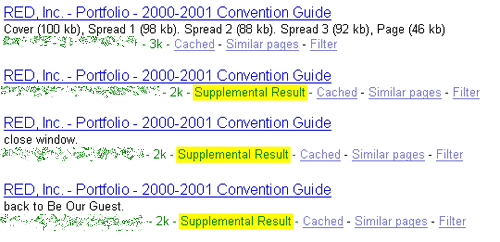The Power of the Title Tag in Rankings
Great Title Tags
Posted by Adam Hayes
Give every page a unique title that is focused on that specific page's keywords.
One of the main things that unknowing webmasters do is create pages that have all the same title. This happens because they do one of the following:
tag They use a template for their html and don't take the time to change the title tag on each page
- They name every page in their site after their business name
- They include the same header file for the top of every page and fail to add the functionality for modifying the title on a page by page basis.
- They just blow it and leave "untitled" as the title of the page
We'll put it another way, would you ever label this picture like this?

No you wouldn't. So why do so many people label their pages with the same title.

As you can see, Google has to guess which page is really the most important with that title and places the rest in the supplemental index. I absolutely love this post over at WebMasterWorld because it is spot on.
While making all your page titles the same may be convenient, it might also be called "suicidal" if you care about organic search results or site usability.
To emphasize what Jim is saying, I have seen identical titles cause archived pages on a major corporate site to go supplemental... not returned in a site:domain search unless you turn off the dupe filter... even though the pages had highly differentiated content.
Oversimplifying a bit... the unit of optimization is the page. The page title is your most powerful onpage optimizing element. Why would you want to throw away the most important tool you have?
As he states the title tag is "your most powerful onpage optimizing element." In order to fully utilize the title tag you need to:
- Make sure that it contains your main keyword near the front of the title
- Isn't too long
- Provides a "hook" to draw in people searching in the search engines
- Provides a quick idea of what the page is about

Leave Comment